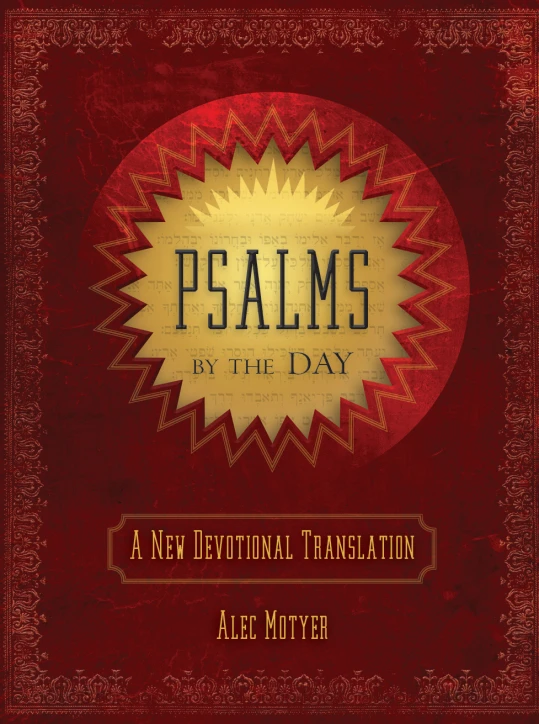Psalms by the Day by Alec Motyer - Psalm 37
New Releases, Updates and More

Prospering wickedness: responses
1. Do not upset yourself over the evil-doers; (aleph) do not become jealous of workers of deviancy,
2. because like grass, quickly, they will fade away, and like green growth they will wither.
3. Trust in Yahweh, (beth) and do good. Live in the land, and tend trustworthiness
4. and find your pleasure in Yahweh, and he will give you your heart’s requests.
5. Commit your way to Yahweh (gimel) and trust in him, and he will take action.
6. And he will bring out your righteousness like the light, and your judgment like the noonday.
7. Be still before Yahweh, (daleth) and wait with keen anticipation for him. Do not upset yourself over one who is making his way prosperous, over the man who is making plans.
8. Let exasperation drop, (he) and leave rage. Do not upset yourself – only to doing evil!
9. Because evil-doers will be cut down, while those who wait for Yahweh will inherit the land.
10. And yet a little while, (waw) and there will not be a wicked one, and you will look searchingly at his place, and he will not be there,
11. and it is the downtrodden who will inherit the land, and will find their pleasure in an abundance of peace.
Hostile wickedness: insights
12. The wicked plots against the righteous, (zayin) and grinds his teeth at him.
13. The Sovereign One laughs at him because he has seen that his day will come.
14. The wicked have drawn their sword, (cheth) and bent their bow to make the downtrodden and vulnerable fall, to slaughter those whose way is upright.
15. Their sword will enter their own heart, and their bows will be broken.
16. Better is a little belonging to the righteous (teth) than the abundance of many wicked,
17. because the arms of the wicked will be broken and Yahweh is indeed upholding the righteous.
18. Yahweh indeed knows the days of the person of integrity (yodh) and their inheritance will be for ever.
19. They will not be disappointed in a period of evil, and in days of famine they will be satisfied.
20. Because the wicked will perish, (kaph) and Yahweh’s enemies are like the splendour of pastures: they come to an end; like smoke, they come to an end!
Pause for Thought
The idea of submissiveness – doing nothing, leaving it to God – is both the strength and weakness of Psalm 37, because there is a time for ‘letting go and letting God’, and there is a time for the intense and often costly activity of fighting back, and these can be confused to our peril. For example, as young Christians we heard notable preachers teaching that sanctification was a matter of ‘letting go and letting God’, and we were grievously led astray, because it’s not! The Bible urges us to resist even unto blood in striving against sin (Hebrews 12:4); it describes our armour for the war, as we wrestle with ‘principalities’ and ‘powers’ (Ephesians 6:10–17, kjv). When it calls us to ‘present’ our ‘bodies’ (Romans 12:1–2, kjv) it does not have in mind a future of dressing gown and slippers, but the arduous road of Christlike virtues (Romans 12:4ff .) and the demanding task of putting on the Lord Jesus Christ (Romans 13:14). We have a race to run with demanding discipline (1 Corinthians 9:24–27); we are in the tough trades of soldiers, athletes and farmers (2 Timothy 2:3–6). But there is also a time for non-retaliation, for leaving it to God (Romans 12:19), for waiting silently for God, holding our tongues and turning the other cheek (Lamentations 3:25–30; Matthew 5:39). In such a time, says Psalm 37, our active response is to trust and delight in Yahweh (3–4), to be still and wait (7), to live in the visible world of trial seeing clearly the invisible world of divine sovereignty and justice (13, 18), to look to the end, secure in Yahweh’s care, even sharing in his laughter (verse 13; Psalm 2:4). Alongside Psalm 37, Isaiah 53: 79 and 1 Peter 2:20–25 make good reading: we are called to be like the Son of God in all things; he is our inspiration and model as well as our Redeemer.
About the Author: Dr Alec Motyer (1924-2016) was a well-known Bible expositor and from an early age had a love for studying God’s Word. He was principal of Trinity College, Bristol and wrote many widely appreciated commentaries and other books.
Where to Buy: Psalms by the Day is available at any good Christian bookstore. If you don’t have a Christian bookstore near you, you may want to consider purchasing a copy from one of the online book retailers listed below:
Buy Now: Christian Focus Amazon Barnes & Noble ChristianBook CLC Bookshops Koorong 10OfThose
